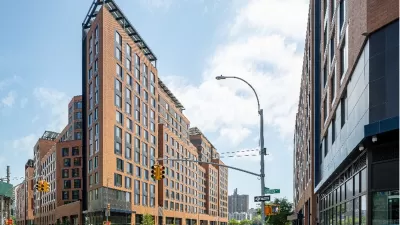With increasing pressure on the nation's supply of affordable housing, low- and middle-income renters are seeing their rents go up while higher-quality apartments drop prices to lure back remote workers.

Over the past year, while residents of high-rent downtowns reconsidered their housing options and high-income renters saw their rents decline, the opposite proved true for low-income renters, reports Catherine Rampell in the Washington Post.
"For well-off tenants, bargains abound. In most major metro areas, rents for high-end residential housing have plummeted, according to data from CoStar, a real-estate analytics company." In Dallas-Fort Worth, high-end apartments saw rents decline by one percent. Chicago saw a drop of 7.6%. Yet average rents on lower-end units ("older or lower-quality structures, with fewer amenities") have increased two percent in DFW and one percent in Chicago in the same time period. In isolated cases, rent went up as much as 40%. Already suffering more from the economic downturn, "low-income households are getting squeezed from both directions — less income and higher prices for what is usually their biggest single monthly expense."
The choice by many higher-income renters who "were already the marginal home buyer" to make the transition to homeownership during the pandemic, according to Jenny Schuetz of the Brookings Institution, has put downward pressure on high-rent apartments, many of which are being vacated by newly untethered remote workers. Combined with a slowdown in construction, this put pressure on landlords to reduce rents to entice new tenants and keep old ones. At the low end of the rental market, however, demand still far outstrips supply. The pandemic-induced "surge in demand for lower-price-point homes ended up bidding those rents higher." Some experts also call the rent increases an "unintended consequence of the federal eviction moratorium imposed last year," which may be incentivizing landlords to make up the lost income with higher rents on the tenants still paying. "Without a greater supply of affordable housing, the two-track pattern is likely to continue," deepening America's economic divide.
FULL STORY: Rents for the rich are plummeting. Rents for the poor are rising. Why?

Study: Maui’s Plan to Convert Vacation Rentals to Long-Term Housing Could Cause Nearly $1 Billion Economic Loss
The plan would reduce visitor accommodation by 25,% resulting in 1,900 jobs lost.

North Texas Transit Leaders Tout Benefits of TOD for Growing Region
At a summit focused on transit-oriented development, policymakers discussed how North Texas’ expanded light rail system can serve as a tool for economic growth.

Why Should We Subsidize Public Transportation?
Many public transit agencies face financial stress due to rising costs, declining fare revenue, and declining subsidies. Transit advocates must provide a strong business case for increasing public transit funding.

How to Make US Trains Faster
Changes to boarding platforms and a switch to electric trains could improve U.S. passenger rail service without the added cost of high-speed rail.

Columbia’s Revitalized ‘Loop’ Is a Hub for Local Entrepreneurs
A focus on small businesses is helping a commercial corridor in Columbia, Missouri thrive.

Invasive Insect Threatens Minnesota’s Ash Forests
The Emerald Ash Borer is a rapidly spreading invasive pest threatening Minnesota’s ash trees, and homeowners are encouraged to plant diverse replacement species, avoid moving ash firewood, and monitor for signs of infestation.
Urban Design for Planners 1: Software Tools
This six-course series explores essential urban design concepts using open source software and equips planners with the tools they need to participate fully in the urban design process.
Planning for Universal Design
Learn the tools for implementing Universal Design in planning regulations.
City of Santa Clarita
Ascent Environmental
Institute for Housing and Urban Development Studies (IHS)
City of Grandview
Harvard GSD Executive Education
Toledo-Lucas County Plan Commissions
Salt Lake City
NYU Wagner Graduate School of Public Service





























